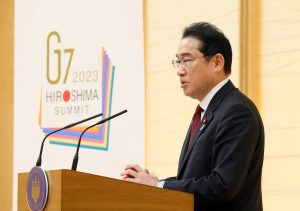The Diplomat author Mercy Kuo regularly engages subject-matter experts, policy practitioners, and strategic thinkers across the globe for their diverse insights into U.S. Asia policy. This conversation with Dr. Naoko Aoki – an associate political scientist at the RAND Corporation and formerly with Kyodo News, Japan’s largest news agency – is the 365th in “The Trans-Pacific View Insight Series.”
Identify the key factors behind Prime Minister Kishida Fumio’s proactive foreign policy approach in elevating Japan’s regional and global leadership.
I think there are two aspects worth discussing in terms of key factors that shape Japan’s foreign and defense policies: the country’s geopolitical environment, and Prime Minister Kishida’s political standing.
At the country level, Japan’s security environment is becoming more challenging. China is rapidly modernizing its military, while its intentions remain unclear. North Korea is improving its nuclear and missile arsenal. On top of that, Russia’s invasion of Ukraine showed how revisionist powers can try to change the status quo with military might. These developments are deeply concerning for Japan and are some of the major elements driving Japanese foreign and defense policies.
On the individual level, Kishida is known for his consensus-building style and is the head of the liberal faction of the ruling Liberal Democratic Party (LDP). In contrast, former Prime Minister Abe Shinzo, arguably the most well-known Japanese leader in recent times, was a staunch conservative. Kishida started out his tenure in 2021 with lingering doubts about whether he can exert strong leadership at a time when Japan is facing many challenges. Kishida faced, and I think still faces, pressure to demonstrate decisiveness to appeal to the conservative wing of the LDP, which is a major group in the party. He also faces pressure to be visible on the international stage and perhaps live up to the standing Abe had.
What signals did Kishida’s surprise visit to Ukraine send to China, Russia, NATO, and the Global South?
Kishida’s visit to Ukraine in March was meant to demonstrate Japan’s solidarity with Ukraine. It was also important because Kishida is scheduled to host an annual summit for the Group of Seven (G-7) in Hiroshima [from May 19-21]. I think both the political elite and the public in Japan were truly alarmed by Russia’s invasion of Ukraine. Opposing attempts to change the status quo with force is important for Japan, given worries about Chinese coercion in Asia. The signal that Japan was trying to send was that the country is committed to opposing such actions and that those who want to preserve the current rules-based world order should work together to uphold it.
How will Tokyo likely exercise Japan’s G-7 presidency to project its global influence?
The G-7 summit comes at a time when its importance is increasing. The U.N. Security Council is dysfunctional because the war in Ukraine has brought China and Russia, two of its five permanent members, closer together to oppose any actions against the invasion as well as some other issues, including attempts to censure North Korea for engaging in ballistic missile activities that violate U.N. Security Council resolutions. This means that the G-7, together with other international forums, are the pathways through which the international community can collectively oppose actions like the invasion of Ukraine. I think Japan realizes this (hence Kishida’s visit to Ukraine, for example) and its G-7 presidency should reflect that responsibility.
Analyze the trajectory of China-Japan competition over regional influence in the Indo-Pacific.
China is an important trading partner for most Asian countries, including Japan, even if it is a security concern at the same time. I don’t think Japan is trying to take China’s place. What Japan is trying to do is to maintain what is frequently called a rules-based international order. Japan wants to prevent China from reshaping and dominating the region using its military power and economic leverage. There are indications that Japan is not the only one that thinks this way. For example, the Quad, which groups Australia, India, Japan, and the United States, is implicitly trying to counterbalance China.
Assess the rising importance of the Japan-U.S. security partnership vis-à-vis growing China-Russia cooperation.
There is a major contrast between the way Japan reacted to Russia’s annexation of Crimea in 2014 and the way Japan responded to Russia’s invasion of Ukraine in 2022. In 2014, Japan imposed relatively mild sanctions on Russia, as it was trying to pursue better ties with Russia and wanted to avoid pushing the country closer to China. In 2022, Japan swiftly condemned Russia and imposed severe sanctions on the country, mainly because it was worried about the risks of allowing such behavior going unpunished. This means that Japan now needs to worry not only about China and North Korea, but also about Russia in terms of security threats. Japan should also be worried about how China and Russia cooperate with North Korea, too.

































